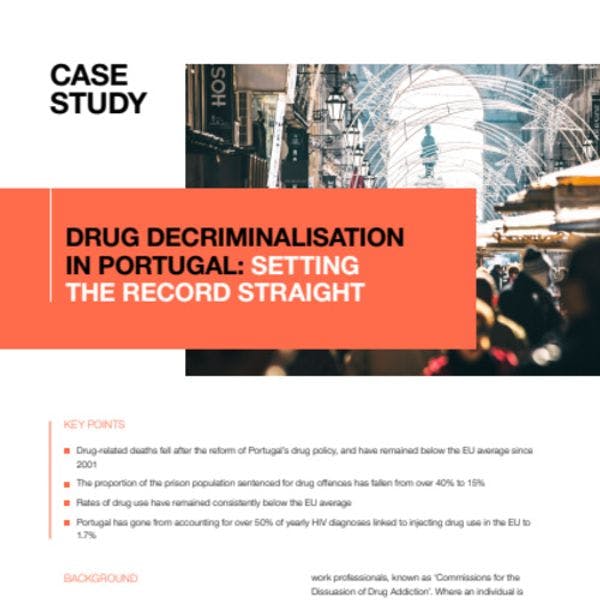Transform
Descriminalización de drogas en Portugal: Aclarando las cosas
Transform resalta las ventajas clave referidas a mejoras en salud y una reducción del encarcelamiento. Más información, en inglés, está disponible abajo.
In 2001, Portugal decriminalised the personal possession of all drugs as part of a wider re-orientation of policy towards a health-led approach. Possessing drugs for personal use is instead treated as an administrative offence, meaning it is no longer punishable by imprisonment and does not result in a criminal record and associated stigma. Drugs are, however, still confiscated and possession may result in administrative penalties such as fines or community service.
Whether such a penalty is applied is decided by district-level panels made up of legal, health and social work professionals, known as ‘Commissions for the Dissuasion of Drug Addiction’. Where an individual is referred to a Commission for the first time and their drug use is assessed as non-problematic (low risk), the law requires their case to be ‘suspended’, meaning no further action is taken. Fines can be issued for subsequent referrals. Where some problematic trends are identified (moderate risk), brief interventions are proposed — including counselling — but these are non-mandatory. In ‘high risk’ cases, where more serious problematic behaviours and dependence are identified, individuals may receive non-mandatory referrals to specialised treatment services.
In the vast majority of instances, problematic drug use is not identified, and cases are simply ‘suspended’. Individuals referred to the Commissions overwhelmingly view their purpose as helping to reduce use and educate on drug risks. They are non-judgemental in nature, and a primary focus is safeguarding the right to health of those referred.
Importantly, the decriminalisation of personal possession is only one part of broader health-centred drug policy reforms that involve an increased focus on harm reduction and treatment provision. By ‘accepting the reality of drug use rather than eternally hoping that it will disappear as a result of repressive legislation’, Portuguese reform allows drugs to be treated as a health, rather than criminal justice, issue. The benefits of these reforms, therefore, arise from both decriminalisation itself and the establishment of a wider health-based response to drug problems.
